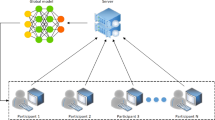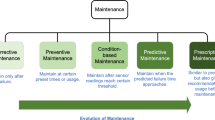Abstract
KubeEdge is an open-source system extending native containerized application orchestration and device management to hosts at the edge. One of the main disadvantages of edge computing is the lack of an effective resource allocation and privacy-preserving framework. The objective of this study dynamic task offloading is an important concept in resource allocation and privacy-preserving framework in Kubeedge-based edge computing using machine learning. This research focuses on enhancing the efficiency and security of edge computing within the framework of IoT devices within a KubeEdge cluster. It begins by gathering crucial data on computational power, memory, and network bandwidth from IoT devices, which is essential for informed decision-making. The study evaluates KubeEdge in terms of computational resource distribution and delay, introducing a privacy-preserving multi-layer Blockchain-enabled data aggregation mechanism. This approach ensures efficient data storage with adaptable and reliable data access control. The research addresses privacy concerns in IoT applications, balancing information loss and disclosure risk, and highlights the impact of forwarding traffic on cluster throughput and service delays in edge computing environments. Dynamic resource allocation algorithms are employed, considering profiling data and machine learning models for real-time task offloading decisions, guaranteeing sufficient allocated resources. A Multi-Agent Collaborative-Reinforcement Learning with Salp Swarm Algorithm is proposed for resource allocation in the edge computing environment, enhancing resource efficiency and secrecy performance. Blockchain ensures secure and transparent transactions, reinforcing trust in the dynamic edge environment. Reinforcement learning optimizes task offloading decisions, adapting to changing conditions. Auction games introduce a competitive mechanism, enhancing efficiency in resource allocation. When combined, they create a robust framework where blockchain guarantees data integrity, reinforcement learning optimizes resource usage, and auction games introduce a fair and efficient task allocation mechanism, ensuring both performance and privacy in computing environments. Furthermore, a Partitioning-Dynamic Collaborative energy-aware task offloading scheme is developed to securely offload tasks while preserving data privacy, enhancing trust computing and task offloading capabilities. The study also proposes a Hybrid Greedy Randomized Adaptive Stackelberg-Auction Game Approach to optimize offloading performance, reduce information loss, and decrease time consumption. This comprehensive framework includes task scheduling to reduce energy consumption, enhance privacy, and security, and reduce latency. The proposed work is analysed based on the Matlab software, and it shows a higher edge offloading rate and lower resource consumption for massive task scenarios in the edge network. Continuous performance evaluation of resource utilization, response time, and privacy protection further improves offloading decision accuracy over time.













Similar content being viewed by others
Data availability
No datasets were generated or analysed during the current study.
References
Min, M., et al.: Safe-learning-based location-privacy-preserved task offloading in mobile edge computing. Electronics 13(1), 89 (2023)
Lan, W., et al.: Deep reinforcement learning for privacy-preserving task offloading in integrated satellite-terrestrial networks. arXiv preprint arXiv:2306.17183 (2023)
Wang, Y., et al.: SEAL: A Strategy-Proof and Privacy-Preserving UAV Computation Offloading Framework. IEEE Trans. Inf. Forensics Secur. (2023). https://doi.org/10.1109/TIFS.2023.3280740
Stadnicka, D., Sęp, J., Amadio, R., Mazzei, D., Tyrovolas, M., Stylios, C., Carreras-Coch, A., Merino, J.A., Żabiński, T., Navarro, J.: Industrial needs in the fields of artificial intelligence, internet of things and edge computing. Sensors 22(12), 4501 (2022)
Zhou, H., Yang, G., Dai, H., Liu, G.: PFLF: privacy-preserving federated learning framework for edge computing. IEEE Trans. Inf. Forensics Secur. 17, 1905–1918 (2022). https://doi.org/10.1109/tifs.2022.3174394
Do, H., Mai, T.P., Tran, Yoo, M.: Deep reinforcement learning-based task offloading and resource allocation for industrial IoT in MEC federation system. IEEE Access. (2023). https://doi.org/10.1109/ACCESS.2023.3302518
Poongodi, M., Bourouis, S., Ahmed, A.N., Vijayaragavan, M., Venkatesan, K.G.S., Alhakami, W., Hamdi, M.: A novel secured multi-access edge computing based vanet with neuro-fuzzy systems based blockchain framework. Comput. Commun. 192, 48–56 (2022)
Zhang, L., Zhou, W., Xia, J., Gao, C., Zhu, F., Fan, C., Ou, J.: DQN-based mobile edge computing for smart internet of vehicle. EURASIP J. Adv. Signal Process. 20221, 1–16 (2022)
Belal, A.L.I.: ALSHIECK. Efficient trust-aware Authentication and task Offloading in Multi-access Edge Computing Using a dual Fuzzy Method Based Zero Trust Security Framework. Diss. RMIT University (2023)
Moghaddasi, K., Rajabi, S.: Multi-objective secure task offloading strategy for blockchain-enabled IoV-MEC systems: a double deep Q-network approach. IEEE Access. (2024). https://doi.org/10.1109/ACCESS.2023.3348513
Kim, S.H., Kim, T.: Local scheduling in kubeedge-based edge computing environment. Sensors 23(3), 1522. (2023)
Čilić, I., Krivić, P., Podnar Žarko, I., Kušek, M.: Performance evaluation of container orchestration tools in edge computing environments. Sensors 23(8), 4008 (2023)
Vaishnavi, B., Praveen Kumar, K.V.: SE-VFC: A secure framework for computation outsourcing in vehicular fog computing environments.
Hua, H., Li, Y., Wang, T., Dong, N., Li, W., Cao, J.: Edge computing with artificial intelligence: a machine learning perspective. ACM Comput. Surveys 55(9), 1–35 (2023)
Kong, L., Tan, J., Huang, J., Chen, G., Wang, S., Jin, X., Zeng, P., Khan, M., Das, S.K.: Edge-computing-driven internet of things: a survey. ACM Comput. Surveys 55(8), 1–41 (2022)
Jiang, H., Dai, X., Xiao, Z., Iyengar, A.K.: Joint task offloading and resource allocation for energy-constrained mobile edge computing. IEEE Trans. Mobile Comput. (2022). https://doi.org/10.1109/TMC.2022.3150432
Wadhwa, H., Aron, R.: Technique for resource allocation and management in fog computing environment. J. Supercomput. 78(1), 667–690 (2022)
Li, Y., Li, H., Xu, G., Xiang, T., Lu, R.: Practical privacy-preserving federated learning in vehicular fog computing. IEEE Trans. Veh. Technol. 71(5), 4692–4705 (2022)
Cheng, H., Huang, Q., Chen, F., Wang, M., Yan, W.: Privacy-preserving image watermark embedding method based on edge computing. IEEE Access. 10, 18570–18582 (2022)
Chen, Y., Gu, W., Xu, J., Zhang, Y., Min, G.: Dynamic task offloading for digital twin-empowered mobile edge computing via deep reinforcement learning. China Commun. (2023). https://doi.org/10.23919/JCC.ea.2022-0372.202302
Chen, Y., Gu, W., Li, K.: Dynamic task offloading for internet of things in mobile edge computing via deep reinforcement learning. Int. J. Commun. Syst. (2022). https://doi.org/10.1002/dac.5154
Yang, S., Lee, G., Huang, L.: Deep learning-based dynamic computation task offloading for mobile edge computing networks. Sensors. 22(11), 4088 (2022)
Wang, X., Ye, J., Lui, J.C.: May. Decentralized task offloading in edge computing: a multi-user multi-armed bandit approach. In IEEE INFOCOM 2022-IEEE Conference on Computer Communications (pp. 1199–1208). IEEE. (2022)
Dhasarathan, C., Thirumal, V., Ponnurangam, D.: Data privacy breach prevention framework for the cloud service. Secur. Commun. Netw. 8(6), 982–1005 (2015)
Irshad, A., Chaudhry, S.A., Ghani, A., Mallah, G.A., Bilal, M., Alzahrani, B.A.: A low-cost privacy preserving user access in mobile edge computing framework. Comput. Electr. Eng. 98, 107692 (2022)
Reddy, S.S.: Risk assessment of type 2 diabetes mellitus prediction using an improved combination of NELM-PSO. EAI Endorsed Trans. Scalable Inform. Syst. 8, 32 (2021)
Reddy, S.S., Gadiraju, M., Meghana Preethi, N., Maheswara Rao, V.V.R.: A Novel Approach for Prediction of Gestational Diabetes based on Clinical Signs and Risk Factors. EAI Endorsed Trans. Scalable Inform. Syst. 10, 3 (2023)
Reddy, S.S., Sethi, N., Rajender, R.: Forecasting diabetes correlated non-alcoholic fatty liver disease by exploiting Naïve Bayes Tree. EAI Endorsed Trans. Scalable Inform. Syst. 10(1), e2 (2023)
Reddy, S.S., Sethi, N., Rajender, R.: Risk assessment of myocardial infarction for diabetics through multi-aspects computing. EAI Endorsed Trans. Pervasive Health Technol. 6(24), e3 (2020)
Reddy, S.S., Sethi, N., Rajender, R.: Rigorous assessment of data mining algorithms in gestational diabetes mellitus prediction. Int. J. Knowledge Based Intell. Eng. Syst. 25, 369–383 (2021)
Reddy, S.S., Sethi, N., Rajender, R., Vetukuri, V.S.R.: Non-invasive diagnosis of diabetes using chaotic features and genetic learning. In Third International Conference on Image Processing and Capsule Networks (pp. 161–170). Cham: Springer International Publishing. (2022)
Reddy, S.S., Alluri, L., Gadiraju, M., Devareddi, R.: Forecasting Diabetic Foot Ulcers Using Deep Learning Models. Proceedings of Third International Conference on Sustainable Expert Systems. pp 211–227 (2023)
Shankar, R.S., Babu, D.R., Murthy, K.V.S.S., Gupta, V.: An approach for essay evaluation using system tools. 2017 International Conference on Innovative Research In Electrical Sciences (IICIRES). IEEE. (2017)
Shiva Shankar, R., Ravibabu, D.: Digital report grading using NLP feature selection. In Soft Computing in Data Analytics (pp. 615–623). Proceedings of International Conference on SCDA 2018. (2019)
Reddy, S., Shankar, Gadiraju, M., Maheswara Rao, V.V.R.: Analyzing student reviews on teacher performance using long short-term memory. In: Innovative Data Communication Technologies and Application, pp. 539–553. Springer, Singapore (2022)
Lokavarapu, V., Srinivas, C., Raminaidu, D., Ravibabu, S.S., Reddy: A framework to recognize the sign language system for deaf and dumb using mining techniques. J. Electric. Eng. Comput. Sci (2023). https://doi.org/10.11591/ijeecs.v29.i2.pp1006-1016
Shiva Shankar, R., Raminaidu, C.H., Ravibabu, D., Gupta, V.M.N.S.S.V.R.: A Survey to Raise the Awareness of Road Accidents Due to NotWearing Helmet. Int. J. Industrial Eng. Prod. Res. 31, 367–377 (2020). https://doi.org/10.22068/ijiepr.31.3.367
Shiva Shankar, R., Murthy, N.D.K.V.S.S., Gupta, V.M.N.S.S.V.K.R.: The Source of Growing Knowledge by Cognitive Artificial Intelligence, 2019 IEEE International Conference on System, Computation, Automation and Networking (ICSCAN), https://doi.org/10.1109/ICSCAN.2019.8878732
Deshai, N., Shiva Shankar, R., Sravani, K., Ravibabu, D.: A Developed Task Allotments Policy for Apache Hadoop Executing in the Public Clouds, 2019 IEEE International Conference on System, Computation, Automation and Networking (ICSCAN), https://doi.org/10.1109/ICSCAN.2019.8878857
Ravi Babu Devareddi, R., Shiva Shankar, K., Murthy, V.S.S.R.: Ch. Raminaidu, Image segmentation based on scanned document and hand script counterfeit detection using neural network, 3rd International Conference on Innovations in Communication Computing and Sciences: ICCS-2021 AIP Conf. Proc. 2576, 050001-1-050001-11; https://doi.org/10.1063/5.0105808 Published by AIP Publishing. 978-0-7354-4253-5/$30.00
Funding
The authors have not disclosed any funding.
Author information
Authors and Affiliations
Contributions
All authors contributed to the design and implementation of the research, to the analysis of the results and to the writing of the manuscript.
Corresponding author
Ethics declarations
Competing interest
The authors declare no competing interests.
Additional information
Publisher’s Note
Springer Nature remains neutral with regard to jurisdictional claims in published maps and institutional affiliations.
Rights and permissions
Springer Nature or its licensor (e.g. a society or other partner) holds exclusive rights to this article under a publishing agreement with the author(s) or other rightsholder(s); author self-archiving of the accepted manuscript version of this article is solely governed by the terms of such publishing agreement and applicable law.
About this article
Cite this article
Lingayya, S., Jodumutt, S.B., Pawar, S.R. et al. Dynamic task offloading for resource allocation and privacy-preserving framework in Kubeedge-based edge computing using machine learning. Cluster Comput (2024). https://doi.org/10.1007/s10586-024-04420-8
Received:
Revised:
Accepted:
Published:
DOI: https://doi.org/10.1007/s10586-024-04420-8




